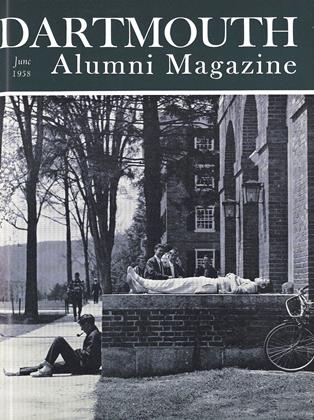ROBERT O. CONANT '13, Registrar of the College, has for 35 years been at the center of both administrative and academic operations at Dartmouth. Student registration, course elections, class scheduling, and official recording of grades and degree credits have been major responsibilities, along with many others - all handled deftly and with the Conant propensity for precision, order, accuracy and calm under pressure. IBM machines have now eased the Registrar's life, but while swifter, they are not likely to be on top of the situation any more than Mr. Conant always has been.
Dartmouth's retiring Registrar did graduate work at Yale, after getting his A.B. degree here in 1913, and then taught French and Spanish at Allegheny College, with an intervening year at DePauw and another at Harrisburg Academy. He returned to Dartmouth in 1919 as Instructor in Romance Languages, became Assistant Dean in 1922, and Registrar in 1923. Mr. Conant for many years has been secretary of the Hanover Country Club. On the golf course his shots are straight and crisp - not unlike the control he has of a job that could easily run away with him.
MAURICE PICARD, Professor of Philosophy, was graduated from Columbia College and took his Ph.D. at New York University in 1919. After several years of teaching at eastern colleges, he came to Dartmouth in 1929 as a full professor. An ordained priest in the Protestant Episcopal Church, Professor Picard often served as part-time minister of local parishes during his early teaching assignments. His book, Values, Immediate and Contributory, and Their Interrelation, was published by the New York University Press in 1920. At Dartmouth he has given courses in logic and the history of philosophy.
HAROLD R. BRUCE, Professor of Government, was graduated from Beloit College and worked as a traveling college representative for the Macmillan Publishing Co. before taking his Ph.D. from the University of Wisconsin in 1920. He came to Dartmouth the following year as Assistant Professor of Political Science. He has been very active in local affairs and it would take a large scrapbook to hold all the press clippings of his talks before civic groups and school audiences. He has been active also in religious groups, serving at one time as interim minister of the First Presbyterian Church, Barre, Vt., and in 1947-48 he was a member of the National Commission of the Congregational Christian Churches on "Church, State and Education." He was a delegate to the New Hampshire Constitutional Convention in 1948. Professor Bruce has written two widely used college textbooks, American Parties and Politics and TheAmerican Political Scene. Next year, under the John Hay Whitney Foundation, he will be Visiting Professor of Government at Pomona College, where he first taught.
GEORGE C. WOOD, Professor of Belles Lettres, was graduated from Harvard in 1916 and received his Ph.D. there four years later. He came to Dartmouth in 1920 and since then has taught in the Spanish, Italian and Comparative Literature Departments. In 1945, Professor Wood was named Professor of Belles Lettres, with the broad assignment of making Baker Library a more effective part of the academic life of the College. When the Senior Fellowship program was reestablished in 1947, he also took on responsibility for its general direction, with headquarters in Baker. Professor Wood's chief loves beyond Hanover are Italy and Nantucket, where he owns a prized ancestral home. On leave of absence for his terminal year, he is in Italy at the present time. He is a member of the Dante Society of Cambridge, Mass., the American Association of Teachers of Italian, and has been awarded the Medaglia de Merito delGoverno Italiano.
EDWIN M. BAILOR, Professor of Psychology, after graduating from Washington State College in 1914, served as a psychological expert with the Army Medical Corps, working with sick and disabled soldiers. Later he was transferred to the Motor Transport Corps with civilian status and supervised the testing and classification of men sent to the motor transport training schools at Fort Holabird, Md. As a training officer for the U.S. Veterans Bureau he was given charge of commercial and correspondence training of disabled veterans in his five-state district. He received his Ph.D. from Columbia in 1925 and shortly thereafter joined the Dartmouth faculty as an associate professor. He has published two books, Content and Form in Tests of Intelligence and Developed Lessons in Psychology, and also numerous magazine articles and book reviews. Professor Bailor's special field has been psychological measurement and the statistical interpretation of such research.
 View Full Issue
View Full Issue
More From This Issue
-
 Feature
FeatureTHE GOALS of a Business Society
June 1958 By ALBERT NICKERSON, -
 Feature
FeatureMUSIC FESTIVAL
June 1958 By GEORGE O'CONNELL -
 Feature
FeatureANTIGONE
June 1958 -
 Feature
FeatureMAY: It's Marvelous
June 1958 -
 Class Notes
Class Notes1918
June 1958 By ERNEST H. EARLEY, RICHARD A. HOLTON -
 Class Notes
Class Notes1910
June 1958 By RUSSELL D. MEREDITH, ANDREW J. SCARLETT, HERB WOLFF '10
Article
-
 Article
ArticleFURTHER GIFT TO SPECIAL WINTER CARNIVAL FUND
March 1921 -
 Article
ArticleClass Day Exercises on the Campus
AUGUST, 1927 -
 Article
ArticleCorrect Addresses
December 1938 -
 Article
ArticlePrize-Winning Editor
October 1951 -
 Article
ArticleDartmouth Course Guide
DECEMBER 1971 -
 Article
ArticleLaptops as Litmus Test
DECEMBER 1998 By James Zug '91


